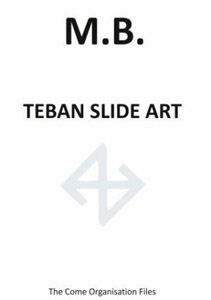 The material contained within this three disc compilation makes for a point of controversy in the noise and power electronics scene over 30 years since it first appeared. Some of Maurizio Bianchi's earliest material was sent to William Bennett's Come Organisation label for release. Before it finally appeared, the material was overlaid with Nazi propaganda speeches, and Bianchi was credited as Leibstandarte SS MB. Bianchi claimed it was done without his consent, while Bennett's contention was that it was how the albums were intended to be released and it was Bianchi's religious conversion soon after their release that triggered his dissatisfaction with the release. Regardless of the history, the resulting material is a mostly strong entry in Bianchi's early catalog.
The material contained within this three disc compilation makes for a point of controversy in the noise and power electronics scene over 30 years since it first appeared. Some of Maurizio Bianchi's earliest material was sent to William Bennett's Come Organisation label for release. Before it finally appeared, the material was overlaid with Nazi propaganda speeches, and Bianchi was credited as Leibstandarte SS MB. Bianchi claimed it was done without his consent, while Bennett's contention was that it was how the albums were intended to be released and it was Bianchi's religious conversion soon after their release that triggered his dissatisfaction with the release. Regardless of the history, the resulting material is a mostly strong entry in Bianchi's early catalog.
While who is right in this argument is not clear, it also does not affect the quality of these recordings.In fact, both sides seem to be justified at different points.Disc one, Triumph of the Will, seems to support Bianchi’s claim.The two long pieces without the speeches would work better:the churning, undulating electronics and simple, but effective rhythmic propulsion of the title piece would work much better on their own, and the melancholy, funereal organs of "To Birkenau" feel out of place amidst the abrasive propaganda.The previously unreleased bonus piece, "Ygolonhcet", has a cleaner, more bass laden sound, with an analog warmth and rattlesnake like synth passages that clearly sound of the same era.
Weltanschauung (which was partially available on the Susan Lawly Anthology 2 compilation of Come Organisation material), however, makes the inclusion of the speeches seem more calculated and artistically justified.Used sparsely, their appearance on "Under the Victory Banner" is nicely balanced by the ebb and flow of noise, mutually benefiting from one another."SS20 Attack" uses air raid siren-like electronics, bomb dropping synths and morose, bass heavy rumbles to fit the title perfectly."Zyklombie" features undulating, thumps and wet outbursts add to the discomfort, which becomes more of a pronounced nausea on "Plutoniumetrio".
Lebensraum seems like it was intended for a Come Organisation release, but never saw the light of day until an unofficial cassette tape release in the 1990s.It does feel conceptually somewhat incomplete, with Bianchi's thin, brittle electronics being cut between Come associate Jordi Valls discussing serial murderers in the first half, and even gets to be a bit like noodling prog rock keyboards at times.I do not think Bianchi actually donned a gold lamé cape during his performance, but it is probably the closest he ever got.The second half of the original cassette feels a bit more slapped together structurally, but his unmistakable depressive electronics and filtered bits of noise shine through.
It is rather surprising that this material ever managed to get a wider release, and from the sound of things, it was mostly culled from vinyl versions of the original releases, leading to an occasionally murky, time worn sound but considering who this is it feels completely appropriate.I do not think anyone looking to check out an early M. B. release is going to expect (or even want) an Eleh level of surgical sonic sterility.
It is irrelevant who made the decision that ultimately resulted in these releases, because their historical importance to a genre can not be overstated.A quick sampling of "Triumph of the Will" reveals where Genocide Organ got their initial sound, and the use of politically and morally ambiguous fascist associated imagery lead to Con-Dom, the Grey Wolves, and pretty much the whole Tesco scene.While the speeches used on Triumph of the Will do seem somewhat slapped on and a bit distracting, the use on Weltanschauung and the associated imagery work quite well, and do not feel at all like a celebration or support of fascism, but instead add to the uncomfortable yet compelling feel to the work as a whole.There might be historical precedent captured in this set, but also a good deal of pleasantly bleak, apocalyptic electronics from one of the early masters of the style.
samples:
 
Read More

